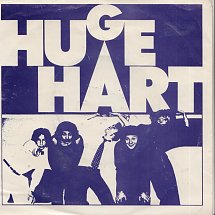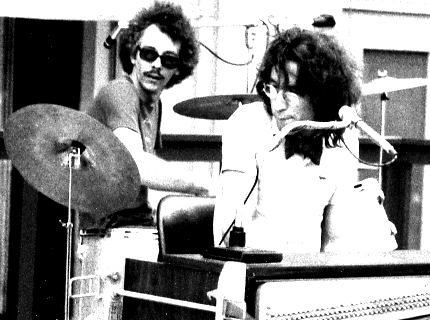
Huge Hart's triple-sided single featured Lucinda, Cat's in Heat and White Sox Fan.
I bought an ancient upright piano for $100 from Gare St. Lazare. Composer/entrepreneur/mad scientist Sparrow and self-anointed "Bob the Mover" plopped the piano on a dolly and roped it to the back of a pickup truck. Then we hauled the hulk five blocks to my one-room joint to audition players and rehearse.
I don't want to say it was a benign dictatorship, creatively, but a lot of musicians came and went.
Now I was all set.
I hung my clothes on the struts of a step ladder, collected $65 a week in unemployment and began my career as a more or less serious songwriter.
Huge Hart's first important gigs happened at Single File, run by the now dead barkeeper Fat Chuck but a cave-like basement club called the Bulls became home base. Populated by gorgeous waitresses, the place stayed open until 5 in the morning, so we played five sets on Saturdays. Cranked on Irish coffees, I'd often tumble onto the icy Lincoln Park streets, hoarse and sweaty, and head to the 24-hour hotel restaurant down the street with brand new friends for eggs, coffee, and gibberish-y chit chat before greeting the dawn,m exhiliarated and exhausted.
Here's the official history, as excerpted from Dean Milano's book Chicago Music Scene: 1960s and 1970s:
From 1975 to 1979, Huge Hart's jaunty pop music attracted critical raves, radio play and a devoted fan base. Wise-cracking singer/songwriter/piano man Hugh Hart, flanked by bass player Jim Morris, guitarist Bruce Barrett and drummer Mark Duran, charmed crowds with rock-meets-Vaudeville tunes documented in their Huge Hart Greatest Hits: Volume II album. Huge alumni also include original drummer Todd Reber plus guitarists Phil Ghallaghan, Steve Fidiuk, Roy Toepper and Ray McKenzie.

Hugh at the piano with Todd Reber on drums performing on the plaza of the now bankrupt Tribune Company.
At the Bulls, I became entranced with Rokko and the Hat, an elegant trio featuring vocalist Annie Hat, Django Reinhardt-channeling guitarist Elliot Delman, and the act's wry pianist/ringmaster Alaric "Rokko" Jans. Rokko, who later composed the score for David Mamet's House of Games movie and shared a 2008 Tony Award as a member of the Chicago Shakespeare Company, asked me to play a loopharmonica playing imp named Speedoo in Captain Marbles' Acting Squad. I also wrote a few tunes for the show, which was directed by Robert Falls and scripted by William H. Macy. Marbles debuted at Mamet's now-defunct St. Nicholas Theatre Company and got revived in late 2008 by Chicago Department for Cultural Affairs' Store Front Theater.
As Huge Hart gained traction on the club circuit, Chicago's Artists-In-Residence program hired me to write musical comedies for its theater program. I scored a "Comedy of Errors" production staged at Navy Pier. I also tunneled into the great American songbook for my Hugo and Me gig. I played piano for senior citizens with singer Wendy Loeff and, later, Sasha Dalton, serenading old folks all over Chicago with Gershwin, Cole Porter and Irving Berlin's greatest hits.
Meanwhile, Huge started to rock harder. The Cars, Elvis Costello, Ramones and Sex Pistols inspired me and my bandmates with the notion that rock and decent lyrics did not have to be mutually incompatible.
In 1979, Huge Hart released a "triple-sided single" featuring Lucinda, Cat's in Heat and White Sox Fan. We then wrote a form rejection letter to record companies' rejecting their rejection letters. In November 1979, Huge played a packed farewell gig at the Bulls and braced for winter.